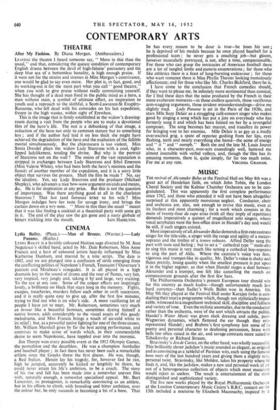CINEMA
LYDIA BAILEY is a lavishly coloured Haitian saga directed by M. Jean Negulesco 's skilled hand, acted by Mr. Dale Robertson, Miss Anne Francis and a host of coloured artists heavily influenced by Miss Katherine Dunham, and marred by a trite script. The date is • 1802, and we are plunged into a confusion of strife emerging from the conflicting politics of Napoleon's French, Toussaint 1 'Ouverture 's patriots and Mirabeau's renegades. It is all played in a high dramatic key to the sound of drums and the roar of flames, very hot, very tropical, very jungly and, taking it bk and large, very exciting. To the eye at any rate. Some of the colpur effects are inspiringly lovely, a brilliance on black that stays long in the memory. Fights, escapes, treacheries, murders follow each other in swift succession, and it is really quite easy to give up, afttr the first few minutes, trying to find out who is on who's side. A more vacillating lot of people I have yet to meet. Mr. Robertson, sometimes very much en brosse like a beautiful footman, sometimes dyeing himself a native brown, adds considerably to the visual assets of this gaudy melodrama, and Miss Francis brings a touch of ice-cold white to its relief; but, as a powerful native fighting for one of the three causes, Mr. William Marshall gives by far the best acting performance, and contrives to make sense of words which, in their commendable desire to seem Napoleonic, have toppled over into the moronic.
Jim Thorpe won every possible event at the 1912 Olympic Games, the pentathlon and the decathlon. He was a champion footballer and baseball player ; in fact there has never been such a remarkable athlete since the Greeks threw the first discus. He was, though, a Red Indian. Herein lay his tragedy, for, however fast he ran, high he jumped, accurately he kicked or lengthily he threw, he could never attain his life's ambition, to be a coach. The story of his rise and fall has been made into a somewhat uneven film with, naturally enough, a somewhat specialised appeal. Mr. Burt Lancaster, its protagonist, is remarkably convincing as an athlete, but in his efforts to climb, with brooding and bitter ambition, over the colour bar, he only succeeds in becoming a bit of a bore. That he has every_ reason to be dour is true—he loses his son ; he is deprived of his medals because he once played baseball for a professional team ; he never gets a coaching job—but gloom, however muscularly portrayed, is not, after a time, companionable. For those who can grasp the intricacies of American football there are a lot of tangled limbs and esoteric enumerations ; for those who like athletics there is a feast of lung-bursting endeavour ; for those who want romance there is Miss Phyllis Thaxter looking tremulously affectionate; and for those who like Mr. Charles Bickford, there he is.
I have come to the conclusion that French comedies should, if they want to please me, be infinitely more sentimental than comical, for I find these days that the noise produced by the French in their more exuberant moments—in those endless quarrels, those vociferous arm-wagging arguments, those strident misunderstandings drive me slightly mad. Lady Paname is set in the Paris of the 1920s, and stars Mlle Suzy Delair as a struggling café-concert singer who makes good by singing a song which has put a jinx on everybody who has formerly sung it and which has been foisted on her by a revengeful composer. The song becomes her mascot, and transfers its power for bringing woe to her enemies. Mlle Delair is as gay as a madly over-excited grig, a spate of repartee gushing from her lips, eyes flashing, teeth and nearly everything else bared—the acme of energy and" it " and " oomph." Both she and the late M. Louis Jouvet who, in a character-part, over-acts exceedingly well, battered me almost insensible with verbal volleys, and, though the' film has its amusing moments, there is, quite simply, far far too much noise.


































 Previous page
Previous page